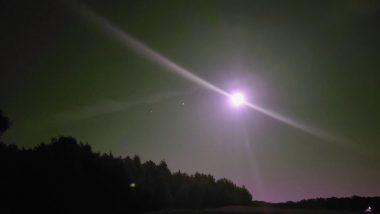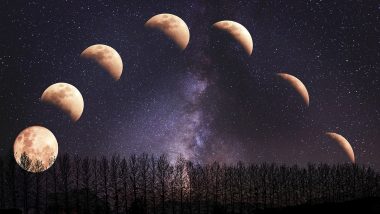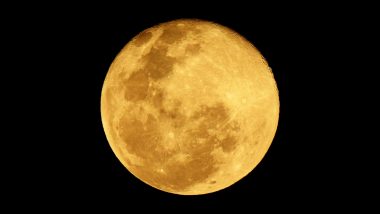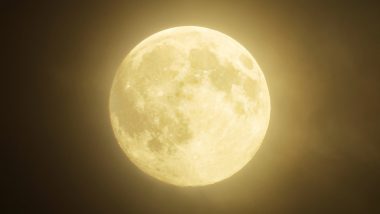The third penumbral lunar eclipse of the year occurred on July 5 in the night sky. It is the fourth eclipse of the year and is not visible from India but can be seen from some other parts of the world. During lunar eclipse 2020, people took to social media sharing pictures and videos of a lunar eclipse which was visible in their region. Photos of the full moon looked a little blurred this time when compared to past penumbral lunar eclipses. Penumbral Lunar eclipse 2020 was visible from parts of South and West Europe, Africa, South America, Pacific, Atlantic, Indian Ocean and Antarctica. Penumbral Lunar Eclipse 2020 Date And Time: Know Visibility in India and Duration of the Celestial Event Coinciding With Full Buck Moon.
People also posted videos of the full moon over hills and mountains capturing it beautifully. The penumbral lunar eclipse began at 8:37 AM IST and reached its maximum peak by 9:59 AM IST. It culminated at about 11:22 AM. The total eclipse lasted for two hours, 43 minutes and 24 seconds on Sunday. While the celestial event was not visible from most places, many others could see it and took to social media posting photos of the event. 2020 Eclipses Calendar With Dates and Time: From June 5 Penumbral Lunar Eclipse to Annular Solar Eclipse on June 21, List of Celestial Events to Occur This Year.
Photo of Penumbral Lunar Eclipse 2020:
The #lunareclipse has a shy bladder. It can't go while you're watching. pic.twitter.com/BQsoDJ6AgI
— Ryan (@Frozen_Photons) July 5, 2020
Woah!
The moon 😍 and fire works #LunarEclipse #lunareclipse2020 pic.twitter.com/RdTSttcpo2
— Kenny (@kennythegreat99) July 5, 2020
Isn't That Awesome!
Moon emerging from behind Mt. Baker, Washington, taken from Coquitlam, BC. #LunarEclipse pic.twitter.com/SvMk4SVzDi
— Peter Debay (@peterdebay) July 5, 2020
Whatta a Moonrise!
We are staying away from the tourists but stepped out to watch the moon rise. ##BuckMoon #LunarEclipse #QuarantineLife pic.twitter.com/UFhVmi5xdI
— GiGi (@GiGiMcK) July 5, 2020
Blurred Vision:
Eclipse starting
God speaking
How do you communicate when all lines of communication are corrupted? You broadcast it in the sky!#LunarEclipse #Download pic.twitter.com/b6MoWtyb8v
— Justin Credible 🇺🇸 (@frost5711) July 5, 2020
Known as Chandra Grahan, the celestial event happens when the Earth blocks the Sun's light from directly reaching the Moon and the outer part of the Earth's shadow, called the 'penumbra'. The July 5 eclipse is harder to spot as the penumbra is fainter compared to the Earth's shadow called ‘umbra'.
Blurred Sight!
So full and bright. We didn’t get this #lunareclipse tonight right. pic.twitter.com/pVp9kHZfrk
— MarigoldHD (@marigoldhaber) July 5, 2020
A Lunar Eclipse occurs when the Moon moves into the shadow of Earth. There are three types of lunar eclipses including Penumbral, Total and Partial. A penumbral lunar eclipse is a phenomenon where the Moon moves through the outer part of the Earth’s shadow. It happens when Earth, Moon and Sun are not completely aligned. During this, the Earth partially blocks the Sun's light from reaching the moon and only a lighter outer shadow of the Earth will fall on the moon.
(The above story first appeared on LatestLY on Jul 05, 2020 11:36 AM IST. For more news and updates on politics, world, sports, entertainment and lifestyle, log on to our website latestly.com).











 Quickly
Quickly















 RR
RR







